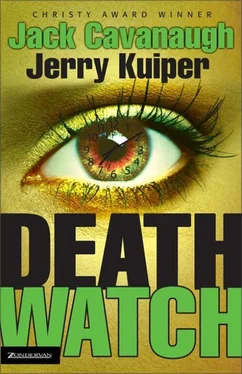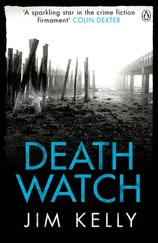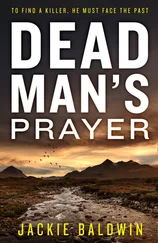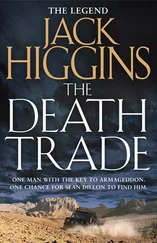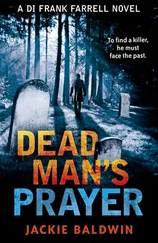Before logging off, she checked her email. It was a reflex, something she did several times a day. Today, however, the moment she hit Enter, while the computer accessed her account, her heart caught in her throat at the sudden realization of what she might find in her in-box.
The screen changed, and she wished she hadn’t initiated the process. She hadn’t really prepared herself for what she might see. She’d forgotten how everything had changed since yesterday.
Checking email. Opening a mailbox. Answering the phone. Answering the front door. Yesterday these were ordinary events. Today, a person’s life could change by any one of them.
Her personalized email screen came up.
Thirteen new messages.
Sydney stared at the number for several moments. A mouse click would list the messages by subject. Was she sure she wanted to do this?
Her breathing was shallow. She was spooked, she admitted it. And the longer she sat there staring at the screen, the more spooked she became.
She reached for the mouse and clicked the program closed. She didn’t want to know. It was better not to know, wasn’t it? It was unnatural for a person to know the precise moment of her death, wasn’t it?
Terminally ill patients knew, but they were given a general time frame. You have six months to live. You have a year to live. To know the exact time was to share an experience with death-row prisoners, but they’d done something to deserve their fate. Even then, some people argued that knowing one’s time of death was cruel and unusual punishment.
It was better not to know. You could put off thinking about it. You could deny it would ever happen to you. You could believe you were going to be the exception to the history of humankind and live forever, or that like Enoch and Elijah, God would spare you the penalty of death and take you straight to heaven. Jesus could return at any moment, couldn’t he?
Sydney stood and backed away from the computer. The screen had returned to the station’s homepage.
She stared at it without looking at it.
Wanting to go. Wanting to know.
She sat back down and logged in. She clicked on the button that called up her email. Since it had already been retrieved, it came up faster this time.
Thirteen new messages.
Taking a deep breath, Sydney clicked on her in-box icon. She scanned the list, looking for two words.
She recognized several online store names, merchandisers from whom she’d ordered who now bombarded her daily with ads. There were replies to emails she’d sent; forwarded email, usually junk poems with animated pictures encouraging you to pass the email to ten friends.
Three quarters down the list she saw it.
Two words.
Death Watch.
Sydney’s mind wasn’t on her driving. She was thinking about the death watch email she’d found in her in-box. It had been sent from the public library by The Rev, the same man who’d tried contacting her yesterday. He claimed he knew who was behind the death watch notices and, this time, wanted her to meet him at the Hollywood Memorial Park Cemetery at noon today. He didn’t give a description of himself, said it wasn’t necessary. He knew what she looked like.
What had Cori said about this guy? That she’d interviewed him for a mental insanity news feature—that was it, wasn’t it? Wasn’t he the guy who claimed he could talk to angels?
Sydney had deleted the message, but she couldn’t stop thinking about it. Probably because the death watch subject heading had scared ten years off her life, and then when she realized it wasn’t what she thought it was, she’d gotten angry at him for scaring her.
But even if she had the time, which she didn’t, she wouldn’t have followed up on the story. Newscasters get tips for stories, every day from people who, nine times out of ten, have an ax to grind or are crackpots.
Pulling to a stop in the middle of a downtown intersection brought Sydney’s mind back to the present. Her left signal blinked repeatedly while she waited for a break in the traffic. A steady flow of cars streamed past. The signal light turned yellow. The cars kept coming. Red. Still the cars came, two, three, four, five, before finally someone stopped, but by then, the cross traffic was crowding into the intersection, honking at her because she was in their way.
Driving in LA used to bother her. Not so much anymore. If you wanted to get around in LA, this was the kind of thing you had to deal with.
Moving again, Sydney shifted her thoughts to the Homeland Security Web site and the growing list of death watch victims. The list was limited to deaths in America. Other Web sites attempted to tally worldwide totals. It was these numbers that would power the KSMJ death watch clock to tick with relentless horror.
Sydney found that scanning the worldwide list of names was in some ways like reading headstones in a cemetery. You’re aware that they were all dead people, but it didn’t impact you emotionally because you didn’t know them.
Reading Lyle Vandeveer’s name on the list was different. His name got to her. It was personal.
She told herself this next interview would be different. She’d made a mistake with Lyle Vandeveer. She let herself get too close to him. She knew at the time it was a mistake, yet she did it anyway. A reporter is supposed to remain detached. Objective. She wouldn’t make that mistake again.
The twin towers of the Excelsior Hotel rose up in front of her. Sydney began preparing herself for the interview, to distance herself mentally and emotionally.
Sydney St. James fell in love with Cheryl McCormick the instant she laid eyes on her. She fell in love with little Stacy a second later. Mother and daughter greeted her with smiles.
“My, they sure grow them pretty out here,” Cheryl said, when she first saw Sydney.
“Actually, I’m an Iowa girl,” Sydney said.
Cheryl invited her in while Stacy stared at her from behind her mother’s legs. For a woman who had just recently learned she was going to die, Cheryl seemed unusually chipper. A show of strength for the little girl’s sake?
“Honey, why don’t you color in the other room,” Cheryl said. “Mommy’s going to talk to this nice lady.”
Sydney was impressed that Stacy agreed without a fuss. Before going, however, she had to show Sydney some of the pictures she’d already colored.
“Wonder Woman!” Sydney flipped page after page of green scribbled faces. “I love Wonder Woman! I used to pretend I was Wonder Woman when I was a little girl.”
Stacy beamed.
While Cheryl deposited her daughter in an adjoining room, Sydney took a quick look around. The suite was immaculate, but cold. Tile floors. Gold inlaid pillars. Cathedral ceiling. Polished ferns strategically placed. Maybe the subject of her visit was influencing her, but it reminded her of a mausoleum.
Cheryl returned and joined Sydney in a little alcove overlooking the city.
“When are you due?” Sydney asked.
“Less than a month,” Cheryl said. “Will there be cameras?”
“The cameraman’s about thirty minutes behind me. I like to do a precamera interview. That way we both know what to expect.”
“How considerate. Thank you. Is what I’m wearing all right?”
Cheryl was dressed in an emerald green maternity top that draped gracefully over her form and set off her red hair.
“You look beautiful,” Sydney said.
It was the truth. Cheryl McCormick had an aura of pleasantness about her that had nothing to do with her expectant condition and everything to do with her personality, which troubled Sydney even more. How could this woman be so composed under the circumstances?
Читать дальше
